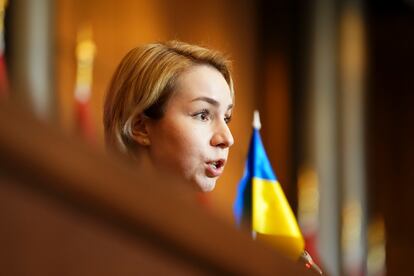Anastasia Radina, Ukrainian politician: ‘Fighting corruption is as important as fighting Russia’
The chair of the Ukrainian Parliament’s Anti-Corruption Committee says that the battle against fraud has made society begin to become aware of this scourge. She vows that, unlike in the past, nobody who is found guilty of corruption is untouchable

Last summer, Oleksii Reznikov — then-minister of defense for Ukraine — was hit by a case of alleged fraud, regarding the purchase of materials for the army. Anastasia Radina, 39, is the head of the Ukrainian Parliament’s Anti-Corruption Committee. She called for accountability. Reznikov challenged her to prove the accusations, or resign. Without being intimidated, on August 26, the legislator for the Servant of the People party — President Volodymyr Zelenskiy’s bloc — gave the minister 48 hours to prove that the purchases hadn’t been made by his nephew (without tender and at triple the price). Reznikov lasted 10 days in office before resigning. Radina is still in her position.
A graduate in Law with a long career as an anti-corruption activist, Radina was elected to federal office in 2010. A married mother of one, she meets EL PAÍS for her interview in the lobby of a hotel in Kyiv, near the Verkhovna Rada, the Parliament of Ukraine. These days, local media outlets are covering the illegal surveillance of the publication Bihus.info, which is dedicated to investigating corruption. Radina firmly expresses that the work of journalists is essential to denouncing this scourge. “People pay attention to them,” she affirms.
According to data provided by Radina’s team, during the 2016-2023 period, the work of all anti-corruption organizations allowed for the recovery of 182 million euros ($196 million). Since February 2022, the Anti-Corruption Committee, the Office of the Prosecutor General and the High Anti-Corruption Court have transferred around $50 million of what was recovered to the Ukrainian Armed Forces as they defend the country from the Russian invasion.
Question. You entered the Parliament of Ukraine five years ago. Is Ukraine less corrupt today than in 2019?
Answer. Ukraine is very different from the country we inherited after the Revolution of Dignity in 2014. I often hear references to Transparency International’s Corruption Perceptions Index. It’s important to be precise: this index isn’t about how corrupt a country is, but about what the population thinks about [the prevalence of corruption]. And I would say that the perception of Ukraine also reflects the work that investigative journalists are doing. Before 2014, the Corruption Perceptions Index [didn’t place Ukraine at a high level]. But we had a government that was half-government, half-criminal group, with an organized system to embezzle more than half of the state budget for the benefit of a single family. And Ukraine wasn’t perceived by the population as very corrupt.
Q. Why?
A. Because when you turned on the television or the radio, you didn’t hear about corruption in Ukraine. When freedom of expression is restored — when journalists and investigative media outlets [are able to do their work] — the population begins to talk about corruption. Scandals have broken out, something that didn’t happen in the time of [President Viktor Yanukovych, from 2010 until 2014]. I think it’s good that the population is aware that corruption is a problem, because that’s how politicians are put under pressure. It’s positive that this awareness exists in public opinion. Opinion polls since 2016 have consistently shown that corruption is one of the three big national problems that people expect politicians to address. This is what has helped us push anti-corruption reform.
Q. Is the way in which society judges corruption changing?
A. Absolutely. A growing number of Ukrainians — 86% — say that corruption is unacceptable. The level of tolerance has been decreasing since the Revolution of Dignity. A number of reforms have also been implemented to address petty corruption, which isn’t about people not wanting to pay bribes, but rather about not having accessible services or understandable procedures. For example, [citizens want to] have the opportunity to enroll their children online in daycare without having to pay money.
For political corruption, independent institutions have been set up from scratch, without the legacy of the old systems inherited from the Soviet Union. There has been success in establishing specialized anti-corruption institutions: an independent preventive agency, an investigation agency, a prosecutor’s office and even a high court. And this is what sends a message to the entire system that there are no untouchable people and that corruption is finally becoming punishable — something that didn’t happen before 2014.
Q. How important is fighting corruption while simultaneously fighting a war against Russia?
A. I would say it’s just as important, because people fight for the country that offers freedom, the rule of law and justice. Our job as politicians is to guarantee the type of country they fight for.
Q. What’s the main concern of the Anti-Corruption Committee?
A. Ensuring that anti-corruption institutions have mandates, powers and resources to be able to act correctly and independently. In reality, I don’t know of any country that has gone this far, even sacrificing some government sovereignty to ensure that these institutions are truly independent of any vested interests or politicians. At the same time, we have a broader mandate [when it comes to] parliamentary oversight. We investigate, for example, cases presented by investigative journalists regarding alleged inflated prices and procurement by the [Ministry of] Defense. What we did after the scandal broke out (about the purchase of materials during Minister Reznikov’s tenure) was to present a legal initiative to introduce transparency in military procurement. This legislation was passed in just a few months, a very fast pace for the Ukrainian Parliament.
Q. How long does Ukraine need for real change?
A. Frankly, this change is already happening. I can give you some numbers: the High Anti-Corruption Court — which has been in operation for four years — has already sentenced 27 judges (in the previous government, there was only one record of a sentence in 2009, against Ihor Zvarych, a magistrate in Lviv). If this doesn’t show us that the system is changing, [nothing will]. It’s important not only because there are people who are serving their sentence in prison, but because judges were considered untouchable for many years. The anti-corruption mechanism is beginning to play a preventive role, which is what we dreamed of in 2014 and 2015.
Q. Have you felt threatened because of your job?
A. I wouldn’t say that I’ve felt any danger. I have a big reputation as a “no-deals” person. I’m proud of that. But just four years ago, we saw how civil society activists were harassed: their houses were burned down, they received threats.
Q. Are these kinds of things still happening, or are they disappearing?
A. The question is: are there individuals or groups of people who would want to use these outdated methods? Unfortunately, yes. We have the case of illegal surveillance of journalists [from the anti-corruption media outlet Bihus.info]. There’s been a reaction, nobody has said it was ok. The important thing is that the authorities now investigate this case, because there’s criminal responsibility. It’s the same as the case of supposedly inflated prices when it comes to purchases being made with public money. There are still people who think they can get away with it. But we also have a newly-created system with rules and institutions to respond to that.
Sign up for our weekly newsletter to get more English-language news coverage from EL PAÍS USA Edition
Tu suscripción se está usando en otro dispositivo
¿Quieres añadir otro usuario a tu suscripción?
Si continúas leyendo en este dispositivo, no se podrá leer en el otro.
FlechaTu suscripción se está usando en otro dispositivo y solo puedes acceder a EL PAÍS desde un dispositivo a la vez.
Si quieres compartir tu cuenta, cambia tu suscripción a la modalidad Premium, así podrás añadir otro usuario. Cada uno accederá con su propia cuenta de email, lo que os permitirá personalizar vuestra experiencia en EL PAÍS.
¿Tienes una suscripción de empresa? Accede aquí para contratar más cuentas.
En el caso de no saber quién está usando tu cuenta, te recomendamos cambiar tu contraseña aquí.
Si decides continuar compartiendo tu cuenta, este mensaje se mostrará en tu dispositivo y en el de la otra persona que está usando tu cuenta de forma indefinida, afectando a tu experiencia de lectura. Puedes consultar aquí los términos y condiciones de la suscripción digital.









































